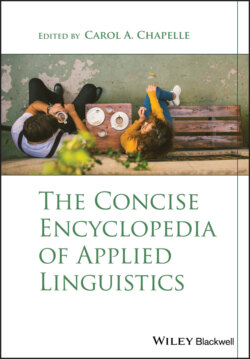Читать книгу The Concise Encyclopedia of Applied Linguistics - Carol A. Chapelle - Страница 44
References
Оглавление1 Ahearn, L. (2001). Language and agency. Annual Review of Anthropology, 30, 109–37.
2 Aro, M. (2016). In action and inaction: English learners authoring their agency. In P. Kalaja, A. F. Barcelos, M. Aro, & M. Ruohotie‐Lyhty (Eds.), Beliefs, agency, and identity in foreign language learning and teaching (pp. 48–66). New York, NY: Palgrave Macmillan.
3 Block, D. (2003). The social turn in second language acquisition. Washington, DC: Georgetown University Press.
4 Block, D. (2007). Second language identities. London, England: Continuum.
5 Bourdieu, P. (1977). Outline of a theory of practice ( R. Nice, Trans.). Cambridge, England: Cambridge University Press.
6 Butler, J. (1990). Gender trouble: Feminism and the supervision of identity. London, England: Routledge.
7 Chomsky, N. (1959). A review of B. F. Skinner's verbal behavior. Language, 35, 26–58.
8 Deters, P., Gao, X., Miller, E. R., & Vitanova, G. (2015). Theorizing and analyzing agency in second language learning: Interdisciplinary approaches. Bristol, England: Multilingual Matters.
9 Feryok, A. (2012). Activity theory and language teacher agency. Modern Language Journal, 96(1), 95–107.
10 Gao, X. (2010). Strategic language learning: The roles of agency and context. Bristol, England: Multilingual Matters.
11 Giddens, A. (1984). The constitution of society: Outline of the theory of structuration. Oxford, England: Polity.
12 Ishihara, N., Carroll, S. K., Mahler, D., & Russo, A. (2018). Finding a niche in teaching English in Japan: Translingual practice and teacher agency. System, 79, 81–90. doi: 10.1016/j.system.2018.06.006
13 Kashiwa, M., & Benson, P. (2017). A road and a forest: Conceptions of in‐class and out‐of‐class learning in the transition to study abroad. TESOL Quarterly, 52(4), 725–47. doi: 10.1002/tesq.409
14 Kayi‐Aydar, H. (2015a). “He's the star!”: Positioning as a tool of analysis to investigate agency and access to learning opportunities in a classroom environment. In P. Deters, X. Gao, E. R. Miller, & G. Vitanova (Eds.), Theorizing and analyzing agency in second language learning: Interdisciplinary approaches (pp. 133–53). Bristol, England: Multilingual Matters.
15 Kayi‐Aydar, H. (2015b). Multiple identities, negotiations, and agency across time and space: A narrative inquiry of a foreign language teacher candidate. Critical Inquiry in Language Studies, 12(2), 137–60.
16 Lantolf, J. P., & Pavlenko, A. (2001). Second language activity theory: Understanding second language learners as people. In M. P. Breen (Ed.), Learner contributions to language learning: New directions in research (pp. 141–58). Harlow, England: Longman.
17 Lantolf, J. P., & Thorne, S. L. (2006). Sociocultural theory and the genesis of second language development. Oxford, England: Oxford University Press.
18 Lave, J., & Wenger, E. (1991). Situated learning: Legitimate peripheral participation. Cambridge, England: Cambridge University Press.
19 Leont'ev, A. N. (1981). The problem of activity in psychology. In J. V. Wertsch (Ed.), The concept of activity in Soviet psychology (pp. 37–71). Armonk, NY: Sharpe.
20 Mercer, S. (2011). Understanding learner agency as a complex dynamic system. System, 39, 427–36.
21 Miller, E. R. (2014). The language of adult immigrants: Agency in the making. Bristol, England: Multilingual Matters.
22 Newman, F., & Holzman, L. (1993). Lev Vygotsky: Revolutionary scientist. New York, NY: Routledge.
23 Ng, P. C. L., & Boucher‐Yip, E. F. (2017). Teacher agency and policy response in English language teaching. New York, NY: Routledge.
24 Norton, B. (2000). Identity and language learning: Gender, ethnicity, and educational change. London, England: Longman.
25 Ortega, L. (2009). Understanding second language acquisition. London, England: Hodder Education.
26 Oxford, R. L. (2003). Toward a more systematic model of L2 learner autonomy. In D. Palfreyman & R. C. Smith (Eds.), Learner autonomy across cultures: Language education perspectives (pp. 75–91). New York, NY: Palgrave Macmillan.
27 Pavlenko, A., & Blackledge, A. (2004). Negotiation of identities in multilingual contexts. Clevedon, England: Multilingual Matters.
28 Pennycook, A. (1997). Cultural alternatives and autonomy. In P. Benson & P. Voller (Eds.), Autonomy and independence in language learning (pp. 35–53). Harlow, England: Longman.
29 Priestley, M., Biesta, G., & Robinson, S. (2013). Teachers as agents of change: Teacher agency and emerging models of curriculum. In M. Priestley & G. Biesta (Eds.), Reinventing the curriculum: New trends in curriculum policy and practice (pp. 187–206). New York, NY: Bloomsbury.
30 Ruohotie‐Lyhty, M. (2011). Constructing practical knowledge of teaching: Eleven newly qualified language teachers' discursive agency. Language Learning Journal, 39(3), 365–79.
31 Smith, P. (2001). Cultural theory: An introduction. Malden, MA: Blackwell.
32 Vygotsky, L. S. (1997). The collected works of L. S. Vygotsky. Vol. 4: The history of the development of higher mental functions ( R. W. Reiber, Ed.). New York, NY: Plenum Press.
33 Weedon, C. (1987). Feminist practice and poststructural theory. Oxford, England: Blackwell.
34 Wertsch, J. V. (1991). Voices of the mind: A sociocultural approach to mediated action. Cambridge, MA: Harvard University Press.
35 White, J. C. (2018). Agency and emotion in narrative accounts of emergent conflicts in a L2 classroom. Applied Linguistics, 39(4), 579–98.
36 William, M., & Burden, R. L. (1997). Psychology of language teachers: A social constructivist approach. Cambridge, England: Cambridge University Press.
